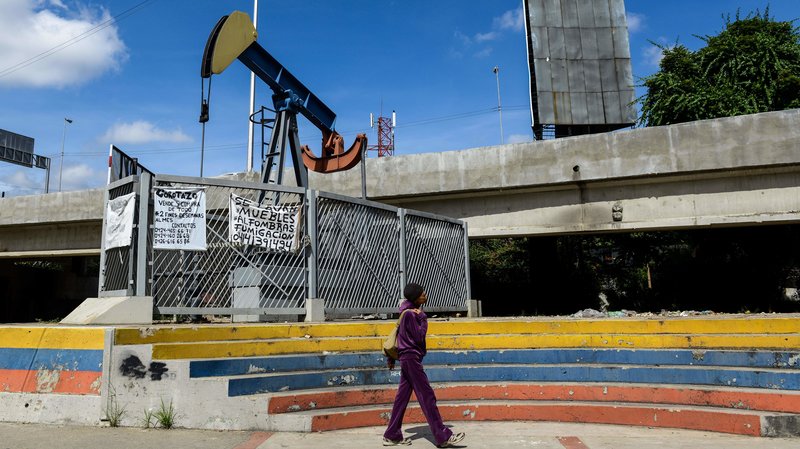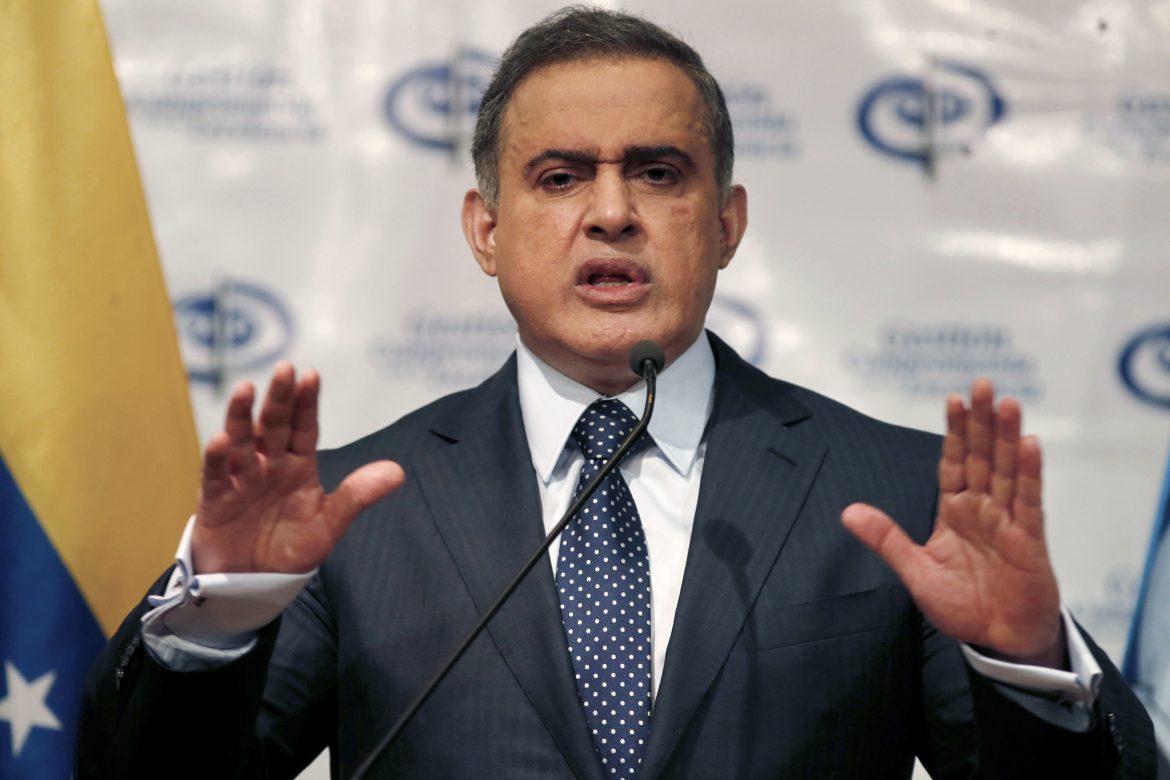Four U.S. Citizens Are Among Those Venezuela Detained for Alleged Graft at Citgo
This material belongs to: WSJ.
Arrests of top Citgo executives are part of what authorities are calling an anticorruption purge of the state oil industry.
CARACAS, Venezuela—American citizens were among the executives at Citgo Petroleum Corp. that the Venezuelan intelligence agency arrested here on Tuesday, a development likely to exacerbate strains between Washington and Caracas.
Venezuela arrested six top executives of the U.S. subsidiary of state-oil company Petróleos de Venezuela SA, including its acting president, as part of what officials called an anticorruption purge. At least four of those arrested are naturalized U.S. citizens, a Citgo official said on Wednesday.
A U.S. State Department spokesman declined to comment, citing privacy laws. Another U.S. official said the American government is monitoring the arrests, citing “significant congressional interest.”
In a statement, Houston-based Citgo said it was looking into the corruption allegations. A Citgo spokesman declined to comment further.
Relations between Washington and Caracas are already tense. President Donald Trump has called Venezuelan President Nicolás Maduro a dictator and his administration has imposed financial and travel penalties on the leader and dozens of his top officials. The U.S. administration has accused members of his administration of drug trafficking and undermining democracy. Mr. Maduro has responded by accusing Washington of trying to overthrow his government.
Speaking late Wednesday, Mr. Maduro claimed the U.S. embassy had called on Venezuela to free the executives, an assertion American officials had not publicly made. “I talked to the attorney general,” Mr. Maduro thundered in a speech carried on national television. “These people were born in Venezuela. They’re Venezuelans and they’ll be tried for corruption, for being thieves and traitors against the fatherland.”
As part of what he called a cleanup of Citgo, Mr. Maduro named a cousin of late president Hugo Chávez, Asdrúbal Chávez, to head Citgo.
Venezuela Attorney General Tarek Saab on Tuesday said the detained executives tried to defraud the nation through a planned $4 billion financing deal with U.S. and Dubai investment funds. He didn’t specify further over the nature of the alleged fraud.
People close to state-owned oil company, known as PdVSA, said the latest arrests owe more to the turf wars inside the authoritarian government than to a serious effort to root out corruption. It is improbable, they said, that Citgo’s executives would embark on a $4 billion deal without the consent of Mr. Maduro, who has installed people close to him to run PdVSA.
Transparency International, a Berlin-based nonprofit group that monitors perception of graft, rates Venezuela as the 10th-most corrupt country in the world. Venezuelan officials dismiss any systemic corruption in government.
The Citgo officials were detained at a PdVSA event at its Caracas headquarters in front of the company’s management, said a person familiar with the matter.
The U.S. citizens among them are refining Vice President Tomeu Vadell, supply Vice President Jorge Toledo, Vice President for Shared Services José Luis Zambrano and the head of the Corpus Christi refinery, Alirio Zambrano. The Citgo official said all four are company veterans who grew up in Venezuela that later became U.S. citizens. The government also detained Citgo acting CEO José Pereira and head of public affairs Gustavo Cárdenas.
None of the executives could be reached for comment.
Mr. Maduro on Tuesday called Citgo’s alleged planned financing deal “treason” that forms part of Washington’s “economic war” against his government.
Mr. Saab said they would be charged with money laundering and embezzlement. “Organized crime has been taking root in the ranks of PdVSA,” Mr. Saab told reporters on Tuesday.
PdVSA President Nelson Martínez, a Maduro appointee, on Wednesday said he supported the investigation to “root out corruption.”
Since taking office in August, Mr. Saab has arrested about 50 managers at PdVSA and its contractors for alleged overpricing and theft, which the government says has hurt the company’s revenue.
Mr. Saab’s anticorruption campaign is highly selective and is driven by politics rather than pursuit of justice, said Mercedes de Freitas, director of Transparency Venezuela, the local branch of Transparency International.
“This action against Citgo appears to be a defensive message by the government that blames everything on [U.S.] imperialism, rather than a serious attempt to protest state assets,” she said.
The arrests are likely to further complicate Caracas’s relationship with the Trump administration at a time when Mr. Maduro is seeking to relax U.S. financial sanctions and refinance Venezuela’s national debt.
The sanctions have made it increasingly difficult for PdVSA to make bank transfers and have practically shut out the struggling company from Western financial markets.
Amid an economic crisis, Mr. Maduro earlier this month announced plans to restructure about $60 billion of the country’s bonds. The government has blamed the need to restructure on the U.S. sanctions.
Mr. Saab said the Citgo board tried to steal public money by refinancing some of the company’s bonds with Frontier Management Group Ltd. of Dubai and Apollo Global Management LLC of the U.S.
A spokesman for Apollo declined to comment. A person close to the company said the company had looked at Citgo’s proposal but didn’t pursue it further. Frontier Management couldn’t be reached for comment.

After Default, Venezuela’s Fiscal Woes Spiral While Prosecutors Focus On Corruption
This material belongs to: NRP.
For a span of some four months earlier this year, demonstrators swarmed Venezuela’s city streets in protest of ballooning inflation, diminishing food and President Nicolas Maduro’s tightening grasp on power — until, that is, Maduro’s efforts to derail the opposition bore fruit. By August the protests ebbed from view, as a new lawmaking body packed with Maduro’s preferred politicians took the country’s reins.
Still, while the protests have all but disappeared, the economic woes that helped inspire them remain as obstinate as ever.
On Tuesday, the credit ratings agency Standard & Poor’s said Venezuela has failed to make interest payments totaling $237 million this week, adding to creditors’ list of grievances against the country. The announcement comes just a week after ratings agencies declared Venezuela’s government and its state-run oil company, Petroleos de Venezuela, in default on some debts.
All told, it’s estimated that Venezuela owes around $140 billion in total external debt.
Meanwhile, CNN reports that Venezuela’s currency has lost 96 percent of its value this year alone. Citing the currency tracker DolarToday, the network notes that the exchange rate was at about 3,100 bolivars to a U.S. dollar; as of this week, it would take 84,000 bolivars to equal that dollar. Steve Hanke, a professor of applied economics at Johns Hopkins University, places the inflation rate at 4,115 percent.
“The economy is really in a complete death spiral,” Hanke told the network. “It’s gotten a lot worse there in the last two weeks.”
Maduro — who has said he plans to “refinance and restructure” the country’s external debt, according to the BBC — has laid the blame for these economic woes largely with “imperialists” such as the U.S., which sanctioned his regime and labeled him a “dictator” this summer.
His top prosecutor Tarek William Saab, who replaced a woman who had grown increasingly critical of Maduro, has also lately embarked on what he calls an “all-out fight to clean up the oil industry,” as quoted by Bloomberg. That includes detaining six high-ranking executives at Citgo, a subsidiary of PDVSA based in the U.S., including the company’s acting president.
Reuters reports that Asdrubal Chavez, cousin of late leader Hugo Chavez, had been chosen to head the U.S.-based refiner on Wednesday.
The executives are suspected of “embezzlement stemming from a $4 billion agreement to refinance company bonds,” the Associated Press reports. But they’re not the only ones to draw the ire of the prosecutor’s office, which the AP says has made nearly 60 arrests on corruption allegations.
“While I’m working hard every day, there’s a group of bandits stealing from the people,” Maduro said in a televised address Tuesday, according to the wire service. “What’s that called? Treason.”
Venezuela’s president, already mocked for gaining weight amid a hunger crisis, pulls out an empanada from his desk during a live TV address. pic.twitter.com/sPw63dbt83
— Hannah Dreier (@hannahdreier) 3 ноября 2017 г.
“The water is up to their noses,” Luis Alfonso Soler, a former PDVSA executive, told Bloomberg. “The work that William Saab is doing is absolutely necessary, but it has to be complete. At this point, we don’t know if it’s only a matter of retaliation.”
And it’s unlikely the country will find its ladder out of economic ills in the hands of the prosecutor alone. Venezuela’s earnings on oil exports, which the BBC says constitutes about 95 percent of its total foreign earnings, have dropped to about a quarter of what they were even five years ago.
“Oil windfall is a gift that you sometimes get, and you should never really manage it as if it is going to be there forever,” Jan Dehn of Ashmore Investment Management told the British network. “The money should be invested so you can generate benefits that are lasting — education, infrastructure investments, improvement in healthcare. But Venezuela has done nothing of the sort.”
The result has been a devastating food shortage. A university survey cited by The Guardian notes that nearly 75 percent of Venezuelans have lost weight in 2017 — some of whom reported weight loss as vast as 78 pounds.
As NPR’s Philip Reeves reported in September, Maduro has blamed the crisis — again — on foreign “imperialists.” And he offered one unusual solution to sate Venezuela’s rampant hunger: eat rabbits.
 info@anticorr.media
info@anticorr.media

